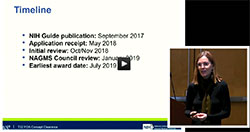UPDATE: The new predoctoral T32 funding opportunity announcement specifically tailored for predoctoral graduate programs in the basic biomedical sciences is now available.
At the recent NIGMS Advisory Council meeting, the Division of Training, Workforce Development, and Diversity requested, and received, approval to write a new predoctoral T32 funding opportunity announcement (FOA), specifically tailored for predoctoral graduate programs in the basic sciences and designed to help catalyze the modernization of biomedical graduate education. The goal is to enable the community to develop and implement innovative approaches to education and mentoring that will more effectively and efficiently train future generations of outstanding biomedical researchers, and will allow graduate education to keep pace with the rapid evolution of the biomedical research enterprise. Taking into account the feedback we have received from various stakeholders over the past year, the new FOA will:
- Emphasize the development of a diverse pool of exceptionally well-trained scientists;
- Focus on skills development, rigor and reproducibility, inclusive and supportive training environments, and responsible conduct;
- Address conflicts in the incentive structure of the research enterprise that adversely impact biomedical graduate education;
- Encourage the use and dissemination of evidence-based, innovative educational and mentoring practices;
- Emphasize improvements in career preparation (broadly defined), and dissemination of career outcomes on publicly available sites.
The intention is not to layer additional activities onto existing structures. Instead, this funding announcement is designed to allow for a creative reinvention of biomedical graduate education that preserves the best elements, while enhancing the focus on the development of research and professional skills by trainees.
We expect to issue the new T32 FOA this fall and to receive the first applications in May 2018. The new FOA will apply to all NIGMS predoctoral T32 training grants, except for the Medical Scientist Training Program (MSTP), which will remain on the parent T32 announcement for now. We plan in the future to develop a parallel FOA that is specific for the goals of the MSTP.
We encourage the community to watch the presentation at our Council meeting and view the slide deck. As always, we welcome your input and feedback on these plans. You can post your comments below.



What impact will this new FOA have on applications submitted prior to May 2018 and existing training programs? Will pending and existing programs be required to resubmit under the new FOA during the non-competing 5-year cycle? Or will programs simply apply under the new FOA at the time of their next competing renewal?
The new FOA will not impact applications submitted prior to May 2018. Current programs will continue, and then come in as new applications to the FOA at the time of their competitive renewal. Pending and existing programs will not be required to resubmit under the new FOA during the non-competing 5-year cycle. All applications for institutional predoctoral training programs (with the exception of Medical Scientist Training Programs) submitted on or after the May 2018 receipt date, including resubmissions, will come in under the new FOA.
Modernization of graduate student education will need to incorporate building the skills to effectively communicate science to expert and non-expert audiences. Being able to talk about their work and career arc provides a way to connect with all listeners. However, scientists must learn how to discuss research in the form of stories that have characters, plot, challenges and emotion. Storytelling has become an integral part of business education and should likewise be an integral part of pre-doc, doctoral and post doctoral training programs. Improved communication skills can enable the students to become (for example) better teachers, more competitive for funding, and more effective influencers of government policies.